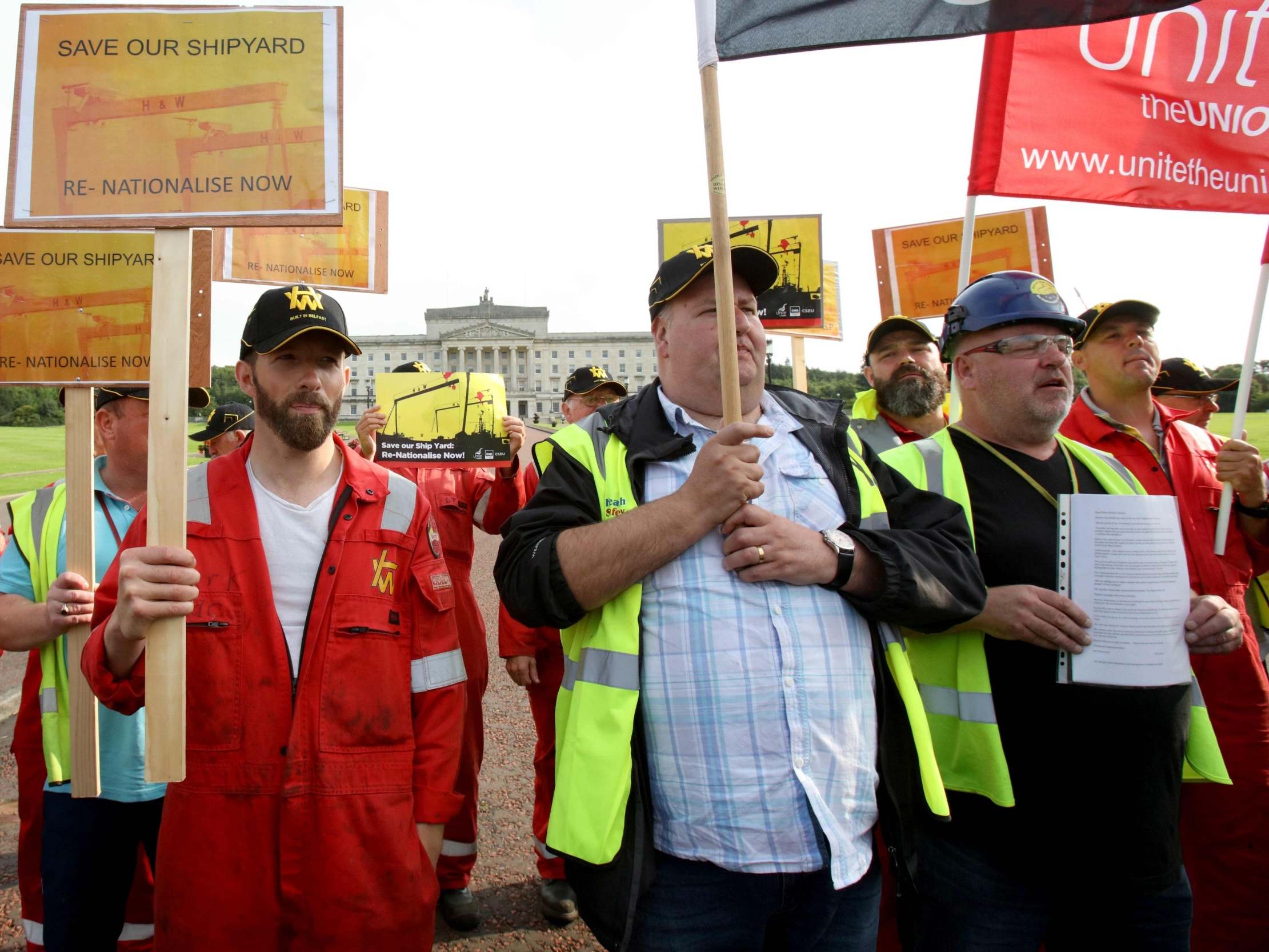The Harland and Wolff workers want to make renewable energy. A Labour government would help them
In the 1970s, Lucas Aerospace workers had a plan to make socially useful products and went to minister for industry Tony Benn for help. Do the workers occupying their shipyard in Belfast have a similar ally in John McDonnell?

A Westminster framing of the struggle over the historic Harland and Wolff shipyards narrow it to one of market versus state: “a purely commercial matter” says Boris Johnson, typically ducking the problem. “We will bring the yards into public ownership,” says John McDonnell anticipating Labour’s plans for government led industrial reconstruction.
The shipyard workers themselves, however, now occupying the yards are taking the search for an alternative to a deeper level, addressing the substantive issue of production itself, envisaging a future based not on the fantasy of a return to the grand Titanic style liners of the past but on producing the infrastructure and inner working of equipment for generating renewable energy through harnessing the power of the wind and the waves .
They are in practice, challenging the value judgement implicit in Johnson’s appeal to the market: that only the market can judge the social merit of a product; only if a product has a market does it have a value.
On the contrary, the workers insist, it would be criminal, in the face of the climate emergency to waste skills and productive capacity which could at minimum cost and through government procurement (and hence political not market, decisions) be put to use immediately to reduce at least the UK’s carbon emissions.
All this would require government support in the interests of citizen survival, a sphere in which the market has clearly failed; indeed the unregulated corporate driven market is the main driver of climate chaos threat.
Moreover, the initiative of the Belfast workers points to a new direction for public ownership and state led reconstruction, a direction already being worked on by Labour. The shipyard workers’ alternative plan, based on a detailed audit of the yard’s productive capacity and on their own skills and experience, illustrates the importance of John McDonnell’s insistence on a new democratic management of public companies based on the principle that “nobody knows better how to run these industries than those who spend their lives with them”.
McDonnell’s confidence in democratising public ownership as a means of maximising the public benefit of public companies, has been inspired by an interestingly similar initiative in the 1970s, of similarly highly skilled workers, aware and indeed proud of the potential usefulness of their skill to the rest of society.
These workers, designers and engineers, working in the different factories of Lucas Aerospace, had, like the Harland and Wolff workers, a tradition of strong organisation and workplace militancy. But for all this militancy, they had not been able to stop the steady decline of jobs; in their case this was mainly the result of technological change as well as competition driven company rationalisations.
As in Belfast, factory closures were the final straw and as with the shipyards, an occupation by itself, was not sufficient to stop closure. For that the Lucas Aerospace workers believed they needed to win political and public support. Tony Benn, then minister for industry, like John McDonnell, was already talking about bringing Aerospace components – and hence Lucas Aerospace into public ownership.

But the workers wanted a deeper kind of change: they’d seen that public ownership of the mines and the railways did not change how the companies were managed or who benefited from their economic “success”. Government increased its revenues but at the same cost of workers’ jobs as in the private sector.
Learning lessons from this, they envisaged public ownership not as an end in itself but a means to sustainable, satisfying and socially useful employment over which they had some control. With this in mind the workplace trade union leaders from the different Lucas Areospace factories, asked their members to draw up an inventory of local machinery and skills and suggest the alternative products they could design or make to meet unmet social needs.
The workers came up with 150 different product ideas for transport – they actually designed the prototype of a “road rail vehicle”; energy conservation, aids for the handicapped, inspired by discussions at local hospitals, and more. ‘”The Lucas Aerospace Workers Plan for Socially Useful Production” became a beacon for a democratic and ecological economics.
It’s ideas live on as vivid, practical proof that there are alternatives to market driven imperatives (Thatcher’s TINA), high carbon energy generation and manufacturing generally, the arms economy and the employment with which it has been associated.
At the core of these alternatives is a participatory and productive form of democracy which releases, and harnesses for the benefit of society the human capacities which the private profit driven market deems “redundant”. Were Labour to make this approach central to its election campaign combined with a strengthening of EU restraints on corporate power, it would become the party able really “to take back control”.
Hilary Wainwright is editor of Red Pepper. Additional research on this article was done by David Ridley
Join our commenting forum
Join thought-provoking conversations, follow other Independent readers and see their replies
Comments
Bookmark popover
Removed from bookmarks